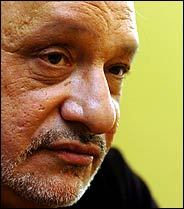On this date in 1937, Isidore “Beansy” Zimmerman spent the day preparing for death in New York’s electric chair … but was spared by an 11th-hour clemency from New York Governor Herbert Lehman.
Here’s the scene, as laid in the anti-death penalty tome of wrongful convictions In Spite of Innocence:
As dawn broke over Sing Sing Prison, Beansy Zimmerman had every reason to think it would be his last day.
Zimmerman numbly went through the pre-execution rituals. The last meal (choose whatever you want), and music (you get to choose that, too) played on the wind-up phonograph. The barber shaves your scalp so the electrodes can fit snugly against your bare skin. The tailor slits one of your trouser legs for another electrode. Officials treat you with unaccustomed politeness. A final family visit — how do you say good-bye when you know it is forever? What should your last words be? Beansy’s mother stayed away, unable to face such finality.
Two hours before execution, Gov. Lehman commuted his sentence.
 In this blog, we lay aside each story day by day, but for those affected, it’s rarely so easy — which is why the mothers of the five men condemned today put in their personal clemency appeals to the governor.
In this blog, we lay aside each story day by day, but for those affected, it’s rarely so easy — which is why the mothers of the five men condemned today put in their personal clemency appeals to the governor.
For Zimmerman and a fellow “accomplice” named Philip Chaleff whose respective roles in a robbery/murder were doubted, it had the desired effect. (Dominick Guariglia, Arthur Friedman and Joseph O’Loughlin weren’t so lucky.)
Chaleff, a diabetic being kept alive just for execution, soon succumbed. For Zimmerman, the execution that did not happen was to define the rest of his 66 years. He was alive, but to what end?
“I wasn’t dead, no,” he remembered. “But every day from now on they’d bury me a little more.”
Zimmerman fought, by becoming a skilled jailhouse lawyer and in 1962 finally winning exoneration from the New York Supreme Court, which held that the testimony against him had been perjured with the connivance of the prosecutor.
He’d spent nearly a quarter-century in prison. Now, he was just another ex-con scrabbling after dead-end employment.
For years thereafter, Zimmerman fought for a special bill that would allow him to sue the Empire State for wrongful imprisonment, finally winning approval in 1981.
His suit asked for $10 million. The judge reckoned Zimmerman’s time and trouble were worth a tenth of that.
Expenses deducted, Zimmerman walked away with $660,000 — that, and sweet vindication.
Fourteen weeks later, he dropped dead of a heart attack.
On this day..
- 1866: The Nashville murderers of William Hefferman - 2020
- 1796: Jerzy Procpak - 2019
- 2015: A man in al-Shaddadah, "I won't forgive you" - 2018
- 1950: Anton van der Waals, traitor - 2017
- 1318: Sir Gilbert Middleton, son of iniquity - 2016
- 1849: Andrew Tyler, clairvoyant - 2015
- 1681: Isabel Alison and Marian Harvey, Covenanters - 2014
- 1909: Remy Danvers - 2013
- 1894: George Painter, Chicago infamous - 2012
- 1891: Ramon Lopez, a Spaniard, aged 38 years - 2011
- 1996: John Albert Taylor, the last American to face a firing squad - 2010
- 2007: Iwuchukwu Amara Tochi, "the burden thus shifted to him" - 2008
